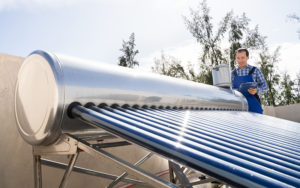What is capital improvement? How is it different from maintenance and repairs? These are two very common questions asked by homeowners. To understand where part of your monthly association dues goes, here’s what you need to know about capital improvements.
What Are Capital Improvements?
Capital Improvement Definition. A capital improvement is a structural addition or alteration that increases the overall value of a property. It can also increase the useful life of a property by improving its quality or strength. Capital improvement can also adapt a property to new use through upgrades or modifications.
In an HOA, capital improvement projects help increase the property values of homes within the community, as well as enhance homeowners’ quality of life. Homeowners can also make capital improvements to improve their personal properties.
Capital Improvements vs Repair Expenses
At first, capital improvements may seem similar to maintenance and repairs. However, they are not the same thing. The purpose of repairs is to maintain the quality of a property.
With maintenance, you repair components so that they are restored to their previous working condition. Routine maintenance may also help protect the underlying property. In order to differentiate between maintenance expense vs capital improvements, here are a few examples.
Maintenance and Repairs
- Applying a sealant to fix a leaking roof
- Replacing the motor bearings in a pool pump
- Putting in new sprinkler heads in the irrigation system
- Applying anti-termite solution to wood treatments in the clubhouse
- Replacing old pipes in the bathroom
- Fixing fitness equipment in the gym
- Sealing cracks on paved roads
- HVAC cleaning and servicing
Capital Improvements
 Replacing the entire roof
Replacing the entire roof- Adding a solar water heater for the pool
- Installing a smart irrigation system with water-saving features
- Installing wall-to-wall carpeting in the clubhouse
- Adding accessibility ramps to common areas
- Constructing a new deck, porch, or patio
- Resurfacing a paved road
- Adding energy-efficient appliances
Should HOA Fund Capital Investments?
Capital improvements are essential to the success of a community. Even with regular maintenance, most components of a property will deteriorate over time and thus, they will need to be replaced. For example, a roof has a lifespan of about 15 to 25 years. Throughout its lifespan, it will require maintenance and repairs. Nevertheless, you will need to replace the roof once it has reached the end of its lifespan.
Capital improvements also increase the value of your property. It can be through the addition of amenities like a playground, basketball court, or park. Even as your community ages, having capital improvements will allow you to attract new homebuyers to the community.
Funding Capital Investments: Where Does the Money Come From?
Since capital improvements are large-scale projects, they can be very expensive. To understand where the money comes from, here’s a brief explanation of an association’s financial accounts.
Operating Funds vs Reserve Funds
 Homeowners’ monthly dues are usually funneled through two main accounts: the operating fund and the reserve fund.
Homeowners’ monthly dues are usually funneled through two main accounts: the operating fund and the reserve fund.
The operating fund pays for the day-to-day expenses of the association. This includes the maintenance and repairs of common areas. From income generated each month, the HOA also puts in a certain amount into their reserve fund. This serves as the association’s savings account. The HOA uses this to fund capital improvement projects and emergency expenses.
A reserve study helps determine which capital improvements are needed and when they can be expected. The association will start saving money based on the findings of the reserve study.
For example, the clubhouse roof is already 10 years old. It will need to be replaced in 15 years’ time and this project is estimated to cost about $30,000. Thus, HOA must start allotting $2,000 each month for the anticipated roof replacement. The process is repeated for other common area components, as well as planned expansion projects.
Capital improvements are also used for emergency expenses. If a natural disaster damages the clubhouse roof beyond repair, the HOA must replace it ahead of time. Thus, it’s always good to have fully funded reserves, you’re your reserve funds are insufficient, the association may have to levy a special assessment on homeowners or take out a bank loan.
An HOA board does not need approval or permission from homeowners to sue the reserves for capital improvement projects. Meanwhile, members’ approval is necessary if the HOA plans to levy a special assessment and the amount is greater than 5% of the annual budget. As a precaution, make sure to consult an HOA attorney or an HOA management company before undertaking major financial decisions like this.
Are There Tax Breaks on Capital Improvements?
HOA associations are non-profit organizations, but they are not exempt from filing annual tax returns. However, both maintenance and capital improvements are tax-deductible as long as they are declared in the tax return forms. Section 162 of the Internal Revenue Code outlines all the requirements for deductible repairs.
If you have upcoming capital improvement projects, it’s still possible to save some money through tax breaks. There are federal tax incentives for those who utilize green building materials and energy-efficient appliances. Make sure to check with your state if there are additional tax credits for your HOA.
Capital Improvements Are Essential for Your HOA
By now, you will be able to answer the question: “What are capital investments?” You also understand that capital improvements are essential to an HOA. They enhance homeowners’ quality of life and attract new homebuyers to the community. As a board member, it’s important to anticipate capital improvement projects so that you can fund them when the time comes. It requires foresight and proper financial planning.
Financial planning can be quite complex. If you need professional help, consider partnering with an HOA management company like Elite Management Services. Feel free to call us at (855) 238-8488 or email us at help@emspm.com.
RELATED ARTICLES:
- HOA Maintenance Checklist: Keeping Tabs On Community Maintenance
- 5 Recommendations To Have A Green HOA
- Is Asking For HOA Special Assessments Allowed?







